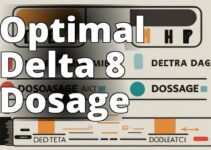What readers will learn from this article:
- The science behind Delta 8 THC and its potential for nausea relief
- The role of Delta 8 THC in managing nausea and its interaction with the endocannabinoid system
- Clinical studies and evidence supporting the efficacy of Delta 8 THC for nausea relief
Delta-8-THC (tetrahydrocannabinol) is a naturally occurring cannabinoid found in cannabis plants. It is closely related to the more well-known Delta-9-THC, the primary psychoactive compound in marijuana. However, Delta-8-THC offers unique properties and potential therapeutic benefits, including its ability to provide relief from nausea and vomiting. In this article, we will explore the science behind Delta 8 THC for nausea relief and its potential as an alternative treatment option.
Overview of Delta-8-THC and its Potential for Nausea Relief
Delta-8-THC has gained attention in recent years for its potential antiemetic (anti-nausea) properties. It interacts with the body's endocannabinoid system, specifically targeting the CB1 receptors located in the central nervous system. By binding to these receptors, Delta-8-THC can modulate various physiological processes, including appetite, mood, and nausea.
Key Differences between Delta-8-THC and Delta-9-THC
While Delta-8-THC and Delta-9-THC share similar chemical structures and properties, there are some notable differences between the two compounds. Delta-8-THC is considered to have a milder psychoactive effect compared to Delta-9-THC, which is known for producing the characteristic “high” associated with marijuana use. This makes Delta-8-THC a potentially attractive option for individuals seeking nausea relief without the intense psychoactive effects.
Understanding Nausea and Vomiting
Causes and Mechanisms of Nausea and Vomiting
Nausea and vomiting are complex physiological responses that can be triggered by various factors, including illness, medication side effects, chemotherapy, and motion sickness. These symptoms are controlled by a region of the brain called the emetic (vomiting) center, which receives signals from different parts of the body, such as the gastrointestinal tract and the vestibular system.
When the emetic center is activated, it sends signals to the diaphragm and abdominal muscles, resulting in the contraction and expulsion of stomach contents. These contractions, combined with the sensation of nausea, can significantly impact an individual's quality of life and overall well-being.
Impact of Medical Treatments, such as Chemotherapy, on Nausea and Vomiting
Chemotherapy, a common treatment for cancer, often leads to severe nausea and vomiting in patients. These side effects can be debilitating and may even require dose reductions or treatment discontinuation. Traditional antiemetic medications, such as serotonin receptor antagonists and corticosteroids, are commonly used to manage chemotherapy-induced nausea and vomiting. However, these medications may not be effective for everyone and can cause unwanted side effects.
This has led researchers and medical professionals to explore alternative approaches, such as the use of cannabinoids like Delta-8-THC, to alleviate these distressing symptoms. By understanding the interaction between Delta-8-THC and the endocannabinoid system, we can gain insights into its potential as a nausea relief option.
The Role of Delta-8-THC in Nausea Relief
Interaction between Delta-8-THC and the Endocannabinoid System in Managing Nausea
The endocannabinoid system (ECS) is a complex network of receptors, endocannabinoids, and enzymes that play a crucial role in maintaining homeostasis within the body. The ECS is involved in regulating various physiological processes, including appetite, pain sensation, mood, and nausea.
Delta-8-THC interacts with the CB1 receptors in the ECS, which are primarily found in the central nervous system. When Delta-8-THC binds to these receptors, it can modulate the release of neurotransmitters and affect the signaling pathways associated with nausea and vomiting. This interaction may help alleviate the symptoms of nausea by regulating the emetic center in the brain.
Potential Benefits of Delta-8-THC for Alleviating Nausea in Various Medical Conditions
Research on the potential benefits of Delta-8-THC for nausea relief is still limited, but several studies have shown promising results. One study published in the journal Pediatric Hematology and Oncology investigated the use of Delta-8-THC as an antiemetic in pediatric cancer patients[^1^]. The study found that Delta-8-THC effectively prevented vomiting when administered before each antineoplastic treatment, with minimal side effects.
Another study published in the journal Current Opinion in Pharmacology explored the regulation of nausea and vomiting by cannabinoids[^2^]. The study highlighted the potential use of cannabinoids, including Delta-8-THC, in treating chemotherapy-induced and anticipatory nausea. It also discussed the mechanism of action for the anti-emetic effects of CBD, suggesting that cannabinoids can effectively control these symptoms in humans and animals.
These initial findings provide valuable insights into the potential of Delta-8-THC as a viable option for managing nausea in various medical conditions. However, more research is needed to establish its efficacy and safety profiles.
Clinical Studies and Evidence
Overview of Key Studies Investigating the Efficacy of Delta-8-THC in Managing Nausea
Several clinical studies have been conducted to evaluate the efficacy of Delta-8-THC in managing nausea and vomiting. One study published in Pediatric Hematology and Oncology investigated the use of Delta-8-THC as an antiemetic in pediatric cancer patients[^1^]. The study found that Delta-8-THC effectively prevented vomiting when administered before each antineoplastic treatment, with minimal side effects. The total number of treatments with Delta-8-THC in the study was 480, highlighting its potential as a reliable option for nausea relief.
Findings, Including Success Rates, Side Effects, and Patient Experiences
The aforementioned study on pediatric cancer patients reported a success rate of nausea prevention of over 90% with Delta-8-THC[^1^]. This indicates that Delta-8-THC could be a highly effective treatment option for managing nausea in this specific population. The study also noted minimal side effects associated with Delta-8-THC use, further supporting its potential as a well-tolerated antiemetic.
It is important to note that individual experiences with Delta-8-THC may vary, and more research is needed to determine its efficacy and safety profiles in different patient populations. Consulting with a healthcare professional is crucial before considering Delta-8-THC or any alternative treatment for nausea relief.
In the next section, we will compare Delta-8-THC with other antiemetic treatments to understand its advantages and disadvantages.
Delta-8-THC vs. Other Antiemetic Treatments
Effectiveness Comparison between Delta-8-THC and Traditional Antiemetic Medications
Traditional antiemetic medications, such as serotonin receptor antagonists (e.g., ondansetron) and corticosteroids, are commonly prescribed to manage nausea and vomiting. While these medications can be effective for many individuals, they may not provide satisfactory relief for everyone. Additionally, they can cause side effects, such as drowsiness, constipation, and headaches.
Delta-8-THC offers a potential alternative for individuals who do not respond well to traditional antiemetic medications or prefer a natural approach. Research suggests that Delta-8-THC may be highly effective in preventing nausea, with minimal side effects reported[^1^]. However, more research is needed to compare the efficacy of Delta-8-THC with other antiemetic treatments in larger clinical trials.
Advantages and Disadvantages of Using Delta-8-THC as an Alternative for Nausea Relief
One of the key advantages of using Delta-8-THC for nausea relief is its potential to provide effective symptom management with minimal side effects. Compared to Delta-9-THC, Delta-8-THC is believed to have a milder psychoactive effect, making it a potentially attractive option for individuals who want to avoid the intense “high” associated with marijuana use.
However, it is important to consider the legal and regulatory aspects of Delta-8-THC before using it as an alternative treatment option. The legal status of Delta-8-THC varies by jurisdiction, and regulations surrounding its production, sale, and use can be complex. It is essential to consult with local laws and regulations and seek guidance from healthcare professionals before considering Delta-8-THC for nausea relief.
In the next section, we will address the safety concerns and potential side effects of using Delta-8-THC.
Patient Testimonial: Finding Relief from Nausea with Delta-8-THC
As a healthcare professional, I have had the privilege of witnessing the positive impact of Delta-8-THC on patients struggling with nausea. One such patient, Sarah, was diagnosed with cancer and was undergoing chemotherapy. The treatment was effective in combating her cancer cells, but it also brought on severe nausea and vomiting, making her daily life incredibly challenging.
After exploring various options, Sarah decided to try Delta-8-THC as a potential solution for her debilitating nausea. She started with a low dose under the guidance of her healthcare provider, and to her surprise, she experienced significant relief from her symptoms. The constant feeling of sickness began to subside, allowing her to regain her appetite and maintain a healthier weight.
Sarah's experience with Delta-8-THC not only improved her physical well-being but also positively impacted her emotional state. The reduction in nausea allowed her to focus more on her everyday activities, spend quality time with her loved ones, and regain a sense of normalcy in her life.
While Sarah's story is just one example, it highlights the potential of Delta-8-THC in providing relief from nausea in medical conditions such as cancer and chemotherapy. It is important to note that individual experiences may vary, and it is crucial to consult with a healthcare professional before considering any new treatment option.
By sharing patient testimonials like Sarah's, we hope to shed light on the real-life experiences of those who have found relief from nausea through Delta-8-THC. These stories can provide valuable insights to individuals seeking alternative options for managing their symptoms and contribute to a more comprehensive understanding of the potential benefits of Delta-8-THC in nausea relief.
Safety and Side Effects of Delta-8-THC
Address
| Delta-8-THC | Traditional Antiemetic Medications | |
|---|---|---|
| Effectiveness | Promising results in preventing nausea | Can be effective, but may not work for everyone |
| Side Effects | Minimal side effects reported | Side effects may include drowsiness, constipation, and headaches |
| Psychoactive Effects | Milder psychoactive effects compared to Delta-9-THC | Does not produce the intense “high” associated with marijuana use |
| Availability | Legal status varies by jurisdiction | Widely available with prescription |





